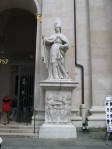A Medieval Christian Fairy World June 18, 2010
Author: Beach Combing | in : Medieval , trackback
Beachcombing greatly enjoys those doctrinal eccentricities that, from time to time, leak out of the mother church and its conglomerates. Who could forget, for example, the early Christian writer Origen mentioning matter-of-factly that souls might be reincarnated Hindu-style ? The early modern church accidentally canonising the Buddha? Or, indeed, some modern mainstream beliefs – Beachcombing hopes that his darling ultra-Catholic wife is not reading?
One of Beachcombing’s favourite examples of Christian eccentricity appears in the thinking of an eighth-century churchman, Virgil, who would eventually become bishop of Salzburg.
Tragically, none of Virgil’s writings survive, but some reports of Virgil’s beliefs did, however, make it through. Virgil, in fact, irritated Boniface of Mainz, Anglo-Saxon missionary and general killjoy who, in c. 748, wrote a letter to the pope of his time, Zachary. This letter does not survive – very few Dark Age letters do. Zachary though wrote back – his letter being copied along with some of Boniface’s epistolae – and in this letter the pope gives a third-hand account of Virgil’s thinking in all its shocking details.
‘As for [Virgil’s] perverse and abominable teaching, which he has proclaimed in opposition to God, and to his own soul’s detriment – if the report of his having spoken thus be true – that is, that there are another world and other men beneath the earth, or even the sun and moon: take counsel and then expel him from the church, stripped of his priestly dignity.’ [John Carey’s translation] ‘De perversa autem et iniqua doctrina, quae contra Deum et animam suam locutus est, si clarificatum fuerit ita eum confiteri, quod alius mundus et alii homines sub terra sint seu sol et luna, hunc habito concilio ab ecclesia pelle sacerdotii honore privatum.’
This passage has long fascinated medievalists who are sometimes even honest enough to say that they do not understand what Virgil is going on about. Certainly Beachcombing cannot make sense of ‘seu sol et luna’ ‘or the sun and moon’. Is this ‘another sun and moon’?
What is clear, if Boniface and Pope Zachary can be relied upon, is that Virgil believed that ‘other men’ lived in some kind of world connected to the present one. But whether this is a regurgitation of the classical idea of ‘antipodes’ i.e. continents on the other side of the globe (the ancients were not flat-earthers), early Extra Terrestrial ravings or some fourth-dimensional Oz is unknown.
One entertaining solution might come by tracing Virgil’s thinking back to its (and his) origins. One near contemporary writer (Alcuin) and almost all later medieval writers concurred that Virgil was Irish (or that he had been associated with Ireland).
The Irish had absorbed Christianity by the eighth century. But they had done so without particularly compromising their own pagan beliefs in the sid or fairy folk: who lived, the Irish believed, parallel to their own world in fairy mounds. At most Christianity brought some polite shuffling of locations and the fairy folk were exiled into mysterious islands in the sea on the other side of the earth, ‘another world’ as Zachary had it.
Did then Virgil , as many Celticists now believe, give vent to an Irish Christian belief in the sid in a now lost sermon? If so Beachcombing can see why Boniface got a nasty rash under his dog collar…
Any insight into this strange passage, especially the sol/luna would be gratefully received. drbeachcombingATyahooDOTcom
The most important work on this subject and the source of the translation above is WANW John Carey, ‘Ireland and the Antipodes: The Heterodoxy of Virgil of Salzburg’, Speculum 64 (1989), pp 1-10
18 Dec 2013: Andy K writes in: I had to offer my thoughts on your post dated June 18 2010 about the heresy of an Irish Bishop of Salzburg. It seems to me a matter of translation: quod alius mundus et alii homines sub terra sint seu sol et luna sol and luna are nominative, so they’re alternative subjects of the verb: that there is beneath the earth, another world and other people, or even a sun and a moon so the sun and the moon are under the earth. That seemed to me to tally with Celtic fairylands, which, as far as I remember were accessed underground but had their own light sources? I couldn’t find any references though. thanks Andy!



